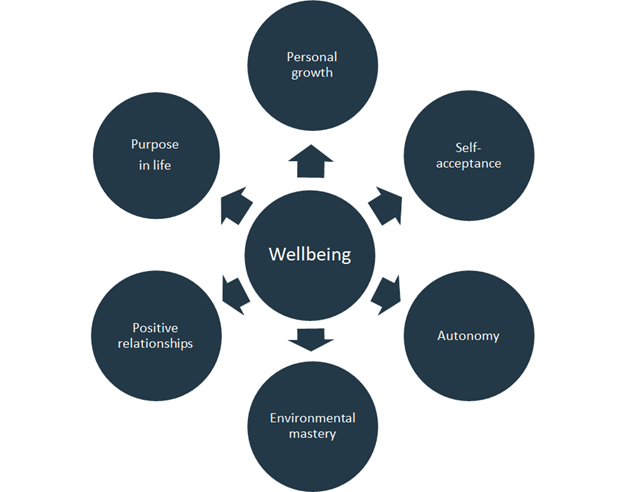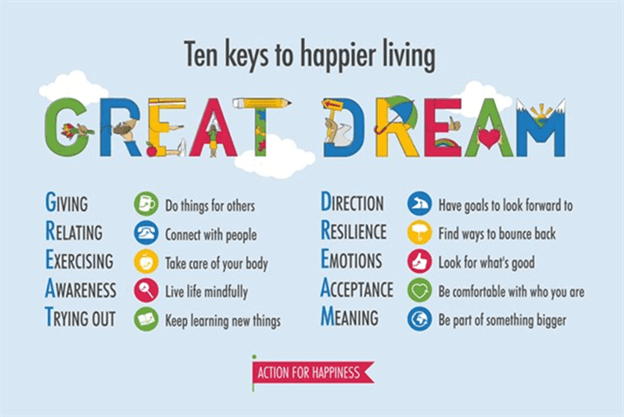What does psychological wellbeing look or feel like?
Written by Dr. Nicola Eccles on 25 Oct 2022
There are many theories around positive mental health which you may have heard of…self-determination, self-actualisation, Maslow’s hierarchy of needs. However, for most of us, in order to understand ourselves we need a really accessible and practical solution or model.
The model or theory below represents a proactive approach to mental health (1). These six ‘plates’ of wellbeing align with key areas that we need to be continually working on to experience psychological wellbeing. So many of us are chasing happiness as a destination along with ‘things’ to possess or distract ourselves with. But these are temporary and fleeting. The key to a sustained positive mindset is to really work on more subtle and permanent elements of life and our perspective on it.
The theory below identifies six key areas we can work on so that we are aiming for positive mental wellbeing as a continual work in progress rather than an end goal. The key is understanding how they all play a part in your psychological wellbeing. It is critical that you work on all elements in tandem. If one of these areas is weak, or lacking, then you may find yourself feeling anxious, or suffering from low mood.
Consider these elements of psychological well being in relation to yourself, which areas are you weakest in and why? Where do you feel strongest? How can you enhance those areas which are weaker?

Self Acceptance
Are you at peace with who you are? Do you embrace yourself wholly and recognise your ‘flaws’ as essential characteristics of your whole self? Are you happy with your overall appearance? If you are constantly berating yourself for things you have said, emails that you have sent, interactions with loved ones that you regret, then it is likely that you may need to strengthen your self acceptance. If you don’t like what you see when you look in the mirror and tend to make (albeit comical) self deprecating comments about your appearance then this will have a subconscious and negative impact on your mental health. Begin with some self compassion and then try to work through re-framing these aspects of your personality and physical self which you dislike.
Purpose in life:
Do you have a clear direction, an identified self ‘remit’, a vision of what your ‘purpose’ in life is? Perhaps there are several ‘purposes’? Without a path, which is visible to you, you may feel disoriented, or just lacking direction. Your ‘purpose’ might look very difficult to someone else. Many of us align our purpose to our careers but if you are trying to define your purpose it is helpful to look beyond a job title. What change, if any, do you want to make in the world? How can you contribute at a personal, interpersonal, local or national level? To create a ‘mission statement’ for yourself can create a filter for decisions and choices that you make….how do they contribute to your own personal purpose?
Environmental mastery:
Do you feel competent and confident in your surroundings? Clearly if you have just moved to a new geographical area, or are starting a new job then your sense of environmental mastery may be low. If however, you are not ‘new’ to the environment then it is vital for your psychological wellbeing that you have a sense of competence and confidence in the spaces and places you inhabit. This includes feeling a sense of control over your roles and actions within your environment. If you feel you lack environmental mastery then take time to consider which elements in particular are preventing you from feeling as though you have environmental mastery, and what actions you can take to rectify this.
Positive relationships:
Most of us experience a mix of positive and less than positive relationships in our lives. This includes, family, work colleagues, friends and people in our communities. Whilst we cannot have the same bonds with everyone, it is important to feel that the majority of your relationships create happy and positive feelings and experiences. Toxic relationships, which leave you feeling confused, angry, defensive or unhappy need to be worked through or eliminated, especially if they are with individuals who play a regular part in your life. It is crucial for your psychological wellbeing that you trust and feel trustworthy in the majority of your relationships and are able to empathise with those close to you.
Personal growth: Do you feel like you are continually learning and growing? That life is not set and stagnant and instead that you are continually evolving, changing and developing in some way? To perceive yourself as able to grow is essential to psychological well-being. A sense of feeling ‘stuck’ can have a significant negative impact on mental health. If you feel bored and disengaged with your life then you need to consider taking action to enhance your own personal growth.
Autonomy:
Do you feel confident and happy with your own opinions and views? This is not to suggest that you don’t need or want the company and help of others but do you feel content in your own company? Do you see yourself as independent and not reliant on others? Are you confident in your own decisions? Or do you feel that you are dependent on other people in order to facilitate aspects of your life? Obviously, to some extent we all rely on others in order to support what we are doing, but there is a balance between being co-dependent, looking to others for opinions and perspectives versus feeling autonomous but engaging with others in co-operative ways.
Use these descriptions as a guide to help you review where you are in your life just now….remember to be compassionate with yourself, and then make an action plan for any changes you could make in the short and long term.
The brilliant charity ‘Action for Happiness’ have this useful ‘Great Dream’ visual which you can use as a prompt if you are struggling with low mood on any given day….
(nb. For consistent and prevailing low mood or anxiety please contact your GP who can help to create an effective treatment plan)

Table 1. Definitions of theory-guided dimensions of well-being (Ryff 2014)
- Ryff, C (2014) Psychological Well-Being Revisited: Advances in the Science and Practice of Eudaimonia. Psychotherapy and Psychosomatics. 2014;83:10–28











